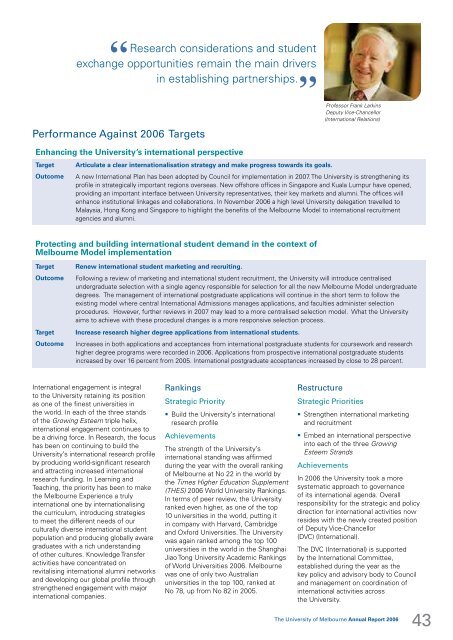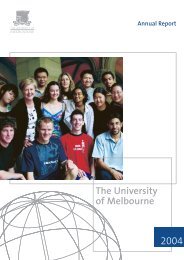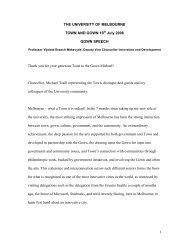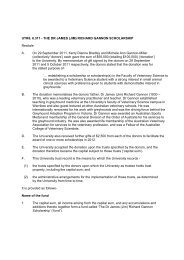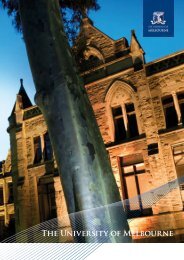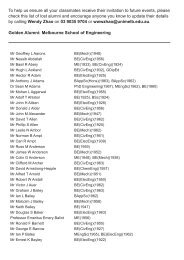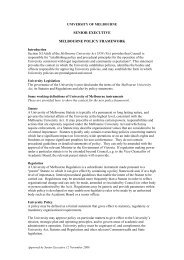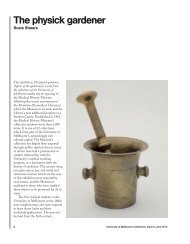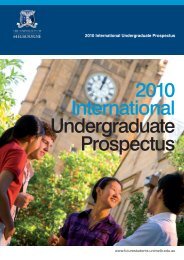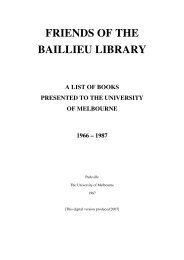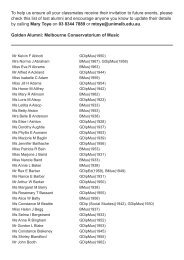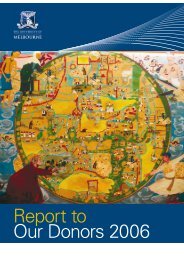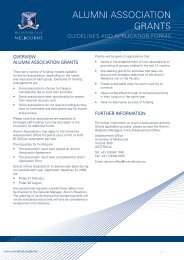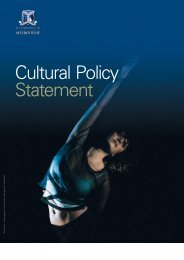annual report/2006 - University of Melbourne
annual report/2006 - University of Melbourne
annual report/2006 - University of Melbourne
Create successful ePaper yourself
Turn your PDF publications into a flip-book with our unique Google optimized e-Paper software.
“<br />
Research considerations and student<br />
exchange opportunities remain the main drivers<br />
in establishing partnerships.<br />
”<br />
Pr<strong>of</strong>essor<br />
Performance Against <strong>2006</strong> Targets<br />
Frank Larkins<br />
Deputy Vice-Chancellor<br />
(International Relations)<br />
Enhancing the <strong>University</strong>’s international perspective<br />
Target<br />
Outcome<br />
Articulate a clear internationalisation strategy and make progress towards its goals.<br />
A new International Plan has been adopted by Council for implementation in 2007. The <strong>University</strong> is strengthening its<br />
pr<strong>of</strong>ile in strategically important regions overseas. New <strong>of</strong>fshore <strong>of</strong>fices in Singapore and Kuala Lumpur have opened,<br />
providing an important interface between <strong>University</strong> representatives, their key markets and alumni. The <strong>of</strong>fices will<br />
enhance institutional linkages and collaborations. In November <strong>2006</strong> a high level <strong>University</strong> delegation travelled to<br />
Malaysia, Hong Kong and Singapore to highlight the benefits <strong>of</strong> the <strong>Melbourne</strong> Model to international recruitment<br />
agencies and alumni.<br />
Protecting and building international student demand in the context <strong>of</strong><br />
<strong>Melbourne</strong> Model implementation<br />
Target<br />
Outcome<br />
Target<br />
Outcome<br />
Renew international student marketing and recruiting.<br />
Following a review <strong>of</strong> marketing and international student recruitment, the <strong>University</strong> will introduce centralised<br />
undergraduate selection with a single agency responsible for selection for all the new <strong>Melbourne</strong> Model undergraduate<br />
degrees. The management <strong>of</strong> international postgraduate applications will continue in the short term to follow the<br />
existing model where central International Admissions manages applications, and faculties administer selection<br />
procedures. However, further reviews in 2007 may lead to a more centralised selection model. What the <strong>University</strong><br />
aims to achieve with these procedural changes is a more responsive selection process.<br />
Increase research higher degree applications from international students.<br />
Increases in both applications and acceptances from international postgraduate students for coursework and research<br />
higher degree programs were recorded in <strong>2006</strong>. Applications from prospective international postgraduate students<br />
increased by over 16 percent from 2005. International postgraduate acceptances increased by close to 28 percent.<br />
International engagement is integral<br />
to the <strong>University</strong> retaining its position<br />
as one <strong>of</strong> the finest universities in<br />
the world. In each <strong>of</strong> the three stands<br />
<strong>of</strong> the Growing Esteem triple helix,<br />
international engagement continues to<br />
be a driving force. In Research, the focus<br />
has been on continuing to build the<br />
<strong>University</strong>’s international research pr<strong>of</strong>ile<br />
by producing world-significant research<br />
and attracting increased international<br />
research funding. In Learning and<br />
Teaching, the priority has been to make<br />
the <strong>Melbourne</strong> Experience a truly<br />
international one by internationalising<br />
the curriculum, introducing strategies<br />
to meet the different needs <strong>of</strong> our<br />
culturally diverse international student<br />
population and producing globally aware<br />
graduates with a rich understanding<br />
<strong>of</strong> other cultures. Knowledge Transfer<br />
activities have concentrated on<br />
revitalising international alumni networks<br />
and developing our global pr<strong>of</strong>ile through<br />
strengthened engagement with major<br />
international companies.<br />
Rankings<br />
Strategic Priority<br />
• Build the <strong>University</strong>’s international<br />
research pr<strong>of</strong>ile<br />
Achievements<br />
The strength <strong>of</strong> the <strong>University</strong>’s<br />
international standing was affirmed<br />
during the year with the overall ranking<br />
<strong>of</strong> <strong>Melbourne</strong> at No 22 in the world by<br />
the Times Higher Education Supplement<br />
(THES) <strong>2006</strong> World <strong>University</strong> Rankings.<br />
In terms <strong>of</strong> peer review, the <strong>University</strong><br />
ranked even higher, as one <strong>of</strong> the top<br />
10 universities in the world, putting it<br />
in company with Harvard, Cambridge<br />
and Oxford Universities. The <strong>University</strong><br />
was again ranked among the top 100<br />
universities in the world in the Shanghai<br />
Jiao Tong <strong>University</strong> Academic Rankings<br />
<strong>of</strong> World Universities <strong>2006</strong>. <strong>Melbourne</strong><br />
was one <strong>of</strong> only two Australian<br />
universities in the top 100, ranked at<br />
No 78, up from No 82 in 2005.<br />
Restructure<br />
Strategic Priorities<br />
• Strengthen international marketing<br />
and recruitment<br />
• Embed an international perspective<br />
into each <strong>of</strong> the three Growing<br />
Esteem Strands<br />
Achievements<br />
In <strong>2006</strong> the <strong>University</strong> took a more<br />
systematic approach to governance<br />
<strong>of</strong> its international agenda. Overall<br />
responsibility for the strategic and policy<br />
direction for international activities now<br />
resides with the newly created position<br />
<strong>of</strong> Deputy Vice-Chancellor<br />
(DVC) (International).<br />
The DVC (International) is supported<br />
by the International Committee,<br />
established during the year as the<br />
key policy and advisory body to Council<br />
and management on coordination <strong>of</strong><br />
international activities across<br />
the <strong>University</strong>.<br />
The <strong>University</strong> <strong>of</strong> <strong>Melbourne</strong> Annual Report <strong>2006</strong><br />
43


